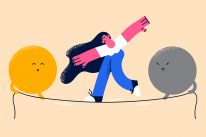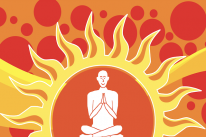
“Every day may not be good, but there’s something good in every day.” ~Unknown
Five months ago, I was sitting outside with a friend when a mosquito bit me under the arm. I went to scratch the bite and felt a lump on the side of my breast. My doctor sent me for a mammogram, ultrasound, and fine needle biopsy. I had breast cancer.
I am a 44-year-old single mother of two beautiful young girls with primary custody. I am also Director of a psychology practice and self-employed.
The day I was diagnosed was the day I lost the carefully constructed control I thought I had mastered in my life. I juggled many balls in the air every day, and they all came falling down.
I strongly believe in salvaging good from bad, but I struggled with finding the silver lining. The fear and anxiety waiting on test results to find out if the cancer had spread were crippling, and I was haunted by dark thoughts of death.
I was lucky. The cancer had not spread, as far as they could tell. The tumor was contained and I had a genetic test done that showed minimal benefit from chemotherapy, assuming I had lumpectomy surgery, radiation, and then took a hormone drug called Tamoxifen for the next ten years.
I think I have found the silver lining in this journey, and my dearest hope, over and above the cancer being gone for good, is that I hold onto these lessons:
1. Let go.
My life before breast cancer was highly organized, disciplined, and controlled. Every spare moment was productive. I saw clients back-to-back, I ferried my daughters to activities, I crammed my weekends with social events, and I had multiple to-do lists for each facet of my life.
I have spent the past five months going where medical people tell me to go, doing what they tell me to do, and waiting. The radiation has made me extremely tired and my brain is simply not functioning.
I returned to work three weeks after surgery in an advanced state of denial, and kept on trying to be the old me but finally accepted I was not.
I don’t do very much now. I go to radiation treatment each day. I come home and do some household chores and then rest. For hours. I may read a book, listen to music, play the piano, I even started a painting. I then pick my girls up from school and spend time with them. And it is a revelation.
Control is an illusion. Letting go of control is liberation.
2. Stop asking, “Why me?”
Why not me? That is the profound answer I have come up with to answer this most difficult of questions. Bad things happen to good people and life is not fair. The test is genuinely is how we cope with the adversity thrown at us.
I am proud of how I have coped with having breast cancer. I have remained psychologically intact, albeit bruised and battered, and allowed myself to be vulnerable. I have dealt with the spectre of dying and have gotten my affairs in order just in case. I also now have a bucket list, and I am crossing things off one by one.
The purpose of life, I have decided, is not to be happy. It is to realize our potential, to love and to be loved, to do new things and take calculated risks. I do not want to get to the end of my life, be it next year or in forty years, and have regrets.
The biggest regrets are the things we did not say or do. So focus on what you can do instead of dwelling on why there are some things you can’t.
3. Ask for support.
I have never been good at asking for or accepting help. I have asked people to come to appointments with me, to pick up my children, to come and sit with me while I cry. I have never been good at crying either, and I have had crying jags that lasted hours since being diagnosed.
I had friends over one day and as they were leaving, I slid to the floor and could not get up because I was sobbing so hard. They bundled the girls and me, took us to their home, and looked after us, me weakly protesting that I was fine. The loss of control and identity associated with melting down felt soul destroying.
So many wonderful people have offered to help, and I am learning to say, “Yes, thank you, that would be lovely.” And it has made me and my relationships stronger, not weaker.
Sometimes we have to ask for what we need and accept being vulnerable.
4. Practice gratitude.
In the blur of normal life, I think we are all guilty of wanting more. We forget to be grateful for what we have, and at its most fundamental, that is life. I would love to be able to write that I am now genuinely grateful for my life, but this would not be entirely true just yet. I slip into denial at times and fall back on old habits, but I am learning.
I am grateful for the immense generosity of my parents, my friends, and my boyfriend, who have given of their time, money, and emotional energy. The parents at my children’s school who delivered us meals. My work colleagues, who have kept my business going, and acquaintances who have contacted me to express their concern.
I have let go of the disappointment I felt over those people who I expected to be there for me but were not.
I have also found myself grateful for things that I took for granted. For my beautiful children, a vase of flowers in the hallway, a good cup of coffee, a flock of birds on my walk, or the ability to pay the bills. I am grateful that I am not dead.
Mindfulness and gratitude let us stay in the present and ward off anxiety, which comes from living in the future.
I obviously do not know what the future will hold. My chance of dying from breast cancer related illness is a lot higher than average, but I am so lucky. I am lucky to be alive, and so are you.
Every day we are not in the ground is a good day, a chance to remake ourselves and our lives into things of value and beauty. Tragedy and trauma can have silver linings. Sometimes it is hard to find them and even harder to hold on to them, but I am holding on tight.
Photo by geralt
About Samantha Young
Samantha is a psychologist, business owner, coach, and writer. She also hopes to be a breast cancer survivor so she can be a grandmother one day. She is planning to write a book about the psychological impact of getting diagnosed with breast cancer, but for now is planting pansies and playing the piano.













 Though I run this site, it is not mine. It's ours. It's not about me. It's about us. Your stories and your wisdom are just as meaningful as mine.
Though I run this site, it is not mine. It's ours. It's not about me. It's about us. Your stories and your wisdom are just as meaningful as mine.
Thank you for your brave and vulnerable story. You’ve reminded me to be grateful for what I have in my life, instead of focusing on what is missing.
What a true post. Loved it!! This quote is what sums it up 🙂 Will hang it up in my office.
Control is an illusion. Letting go of control is liberation.
Your story is very inspirational, Samantha, thank you for sharing 🙂
Very inspiring Samantha, thank you for sharing your story with us.
God bless you Samantha.
We are all going somewhere, we just lost our map. Day in day out we make progress, we just ignore it because we are more focused on the things we are doing wrong than on the advance we are making.
Thank you so much for sharing. So much wisdom packed into one article.
This article is So amazing. Thank you. I really needed to read that. I feel so lucky to have come across it. After loosing my boyfriend of 6 years, a lot of what you wrote really hit home for me.
Thank you & enjoy this day.
Asking For Support can be so challenging sometimes. There is a part inside all of us at times that feels we don’t deserve it, or can do it all alone. The power struggle or the best and worst of our ego creates excess struggle that could be avoided if we only reached our hand out !
Great post, thank you . @GrowthGuided
This is exactly what I needed to read. I struggle with anxiety and sometimes need reminding to enjoy the present moment.
You’re extremely inspiring, thankyou for sharing your story. Wishing you the best.
Truly an inspiring post! Thank you for sharing your experience, I hope you receive a full bill of health report soon!!! These tips are wonderful, thank you!! 🙂
Many thanks, Samatha, for sharing this difficult part of your life path with us here. I too am a psychologist and happily, a 30+ year cancer survivor. That catastrophe, with some others not long after, proved a turning point for me. I went back to school and became a psychotherapist. My contemplative practice has helped me since manage the twists and turns of my life. I wish you all the best in your current challenges. As you wrote, tragedy and trauma CAN have silver linings. Namaste.
Your post really touched me. I am a cancer survivor and much of what you said resonates with me. So much becomes unimportant that used to be very important. It’s a liberation. I know you will continue to live your life with the old blinders off. It’s a gift really.
This is a beautiful and honest article. The thought about “life not being fair” and “giving up control” were spot on. Thank you.